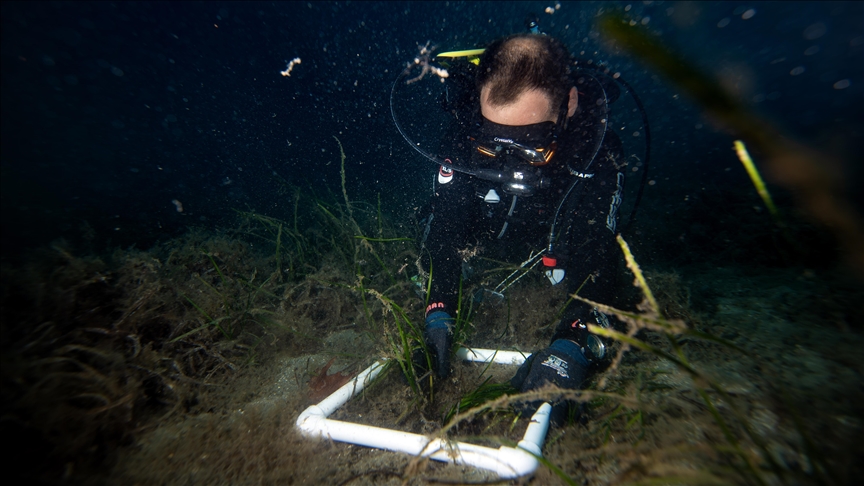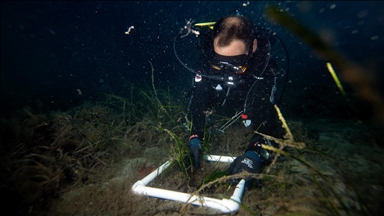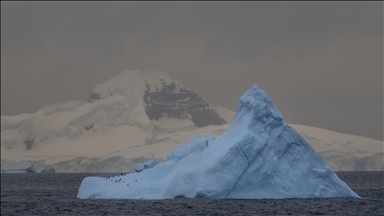First 'climate tipping point' being crossed: Coral reefs in crisis, is there still a way back?
Warm-water coral reefs cross thermal tipping point, undergoing unprecedented dieback, marking Earth’s first climate ‘tipping point,’ says Global Tipping Points Report 2025
 File Photo
File Photo
- Tipping point occurs when changes within system become ‘self-propelling’ and ‘hard to reverse,’ lead author tells Anadolu
- ‘It's kind of life or death for a lot of people,’ says Melanie McField, report author
- International Coral Reef Society chief describes report as ‘last warning,’ says point of no return not yet reached
ISTANBUL
What scientists once warned as a possibility has now become a reality. Warm-water coral reefs, among the planet’s most vital ecosystems, are crossing a "climate tipping point," according to the Global Tipping Points Report 2025.
Authored by 160 scientists from 23 countries and 87 institutions, the report, released last week, serves as a stark wake-up call to a world distracted by daily crises and forgetting the tangible reality of global warming.
It warned that “the world has entered a new reality,” with ecosystems nearing dangerous thresholds as global heating is set to soon surpass the 1.5C limit.
The prospect of interconnected tipping points pushing humanity toward an irreversible climate crisis has immediately sparked questions about what these thresholds mean for the planet and whether they could mark the beginning of the end.
What does crossing tipping point mean?
One of the report’s most alarming findings is that warm-water coral reefs are crossing their thermal tipping point, undergoing unprecedented dieback, and marking Earth’s first climate “tipping point.”
The report notes that reefs are facing “unprecedented mortality” from repeated mass bleaching events. Their central thermal limit — 1.2C above pre-industrial levels — has already been exceeded, and their upper threshold of 1.5C could be reached within the next decade.
Tim Lenton, lead author and professor at the University of Exeter, explained to Anadolu that a “tipping point” occurs when changes within a system become “self-propelling” and “hard to reverse,” ultimately pushing it into a different state.
For coral reefs, this would mean the loss of habitat for “over a quarter of the ocean’s species,” leading to reduced marine biodiversity and weakening the ocean’s capacity for future evolution.
Melanie McField, founder and the director of the Healthy Reefs for Healthy People Initiative and one of the authors, also told Anadolu that current events are unfolding exactly as scientists predicted as the world nears the 1.5C limit.
Both McField and Lenton emphasized that climate change and global warming are the primary drivers of this “unprecedented mortality,” further worsened by overfishing, pollution, and other cumulative pressures.
In the meantime, the report also warns that coral reefs are not alone in danger. The Amazon rainforest could also face widespread dieback below 2C global warming, which Lenton explained would severely damage biodiversity, disrupt climate patterns especially across South America, and further accelerate global warming.
The report also warns that the Greenland and West Antarctic ice sheets are already nearing their tipping points.
“If triggered this would commit the world to up to 10 meters of sea level rise in the long-run (of centuries), threatening land currently inhabited by a billion people,” Lenton explained.
What happens when coral reefs die?
According to the report, coral reefs provide essential habitat for over 800,000 species — including a quarter of all marine fish — and generate an estimated $9.9 trillion in goods and services each year, sustaining the livelihoods of up to 1 billion people worldwide.
Both McField and Lenton warned that losing coral reefs would mean losing vital food sources, coastal livelihoods like fishing and tourism, and even natural protection from storms, threatening the very survival of communities that depend on them.
“It's kind of life or death for a lot of people,” McField underscored.
She further highlighted the potential medicinal value at risk, as unique chemical compounds from reef organisms have shown promise in drug discovery.
“We don't know what we're losing by losing coral reefs,” McField added, suggesting that impact of losing coral reefs could be much greater than one realizes.
She also cautioned that even more alarming consequences could follow the decline of coral reefs.
“If that doesn't bother you enough, if you're not really a coastal living person, and it doesn't seem that relevant, the next things will,” McField noted.
Point of no return?
While headlines about crossing climate tipping points have stirred fears of irreversible catastrophe, scientists stress that the world has not yet reached the point of no return.
Christian Voolstra, president of the International Coral Reef Society, told Anadolu that the report should be seen as a “last warning” and noted that the world has not yet reached the point of no return.
Reaffirming that coral reefs are in “grave danger,” he stressed that not all are equally threatened and warned that focusing solely on alarming headlines could lead people to believe it is too late to act.
“What we cannot let happen is that we use this report as an excuse to not do anything,” Voolstra added, urging people to use the report as a motivation to take action and focus on the fact that some tipping points can still be reversed.
He emphasized that ecosystems are changing rapidly and cannot simply return to their previous states under current conditions, highlighting the need to rethink biodiversity protection and restoration.
McField also said: “It's not irreversible at this point. So, we still have that little window, but it's got to be an absolutely dramatic change, a radical change from the trajectory of what we're doing now.”
However, she noted that there is “no sign” of such a change unless someone comes up with an “11th-hour” solution, a game-changing idea that could alter everything.
“It's worrisome to be thinking that that's what we're hoping for. It's like a last-ditch saving idea that's new and going to change things,” McField added.
‘We have to do everything all at once’
Asked about solutions, McField stressed that “we have to do everything all at once. That’s the only way we’ll solve it.”
McField, Lenton, and Voolstra all emphasized the importance of studying ecosystems and communities that are still showing resilience to uncover potential solutions.
“We can learn from them that working with (rather than against) nature’s feedback loops is the secret to long-term flourishing together,” Lenton underscored.
He said the focus should be on protecting the fraction of reefs that are still viable by reducing other human pressures to maintain their resilience.
“The next narrative is to buy time and you can buy time by conservation, which basically means that you protect marine areas,” Voolstra also said, stressing that “it’s always cheaper to protect than to have to rebuild.”
Also stressing the need to tackle greenhouse gases, McField specifically highlighted reducing methane, as it can deliver faster temperature benefits than carbon dioxide.
“We need to stop global warming and then reverse it by scaling up sustainable carbon removal from the atmosphere. That’s the way to prevent further irreversible damages and ultimately to regain a sustainable climate for coral reefs,” Lenton said.
Underlining that the world is entering a “danger zone” where additional tipping points could be triggered, Lenton urged fast adoption of zero-emission technologies and behaviors, “which have their own positive tipping points where adoption becomes self-propelling.”
Voolstra noted that there is a real chance for improvement, pointing to studies during the COVID-19 lockdown that showed how quickly nature can rebound – a point he said hasn’t received enough attention.
“Instead of worrying about the future, people should be acting – to play their part in triggering positive tipping points towards sustainable behaviours and technologies – and letting their governments know they support more urgent and decisive action on the climate crisis,” Lenton added.
Anadolu Agency website contains only a portion of the news stories offered to subscribers in the AA News Broadcasting System (HAS), and in summarized form. Please contact us for subscription options.





